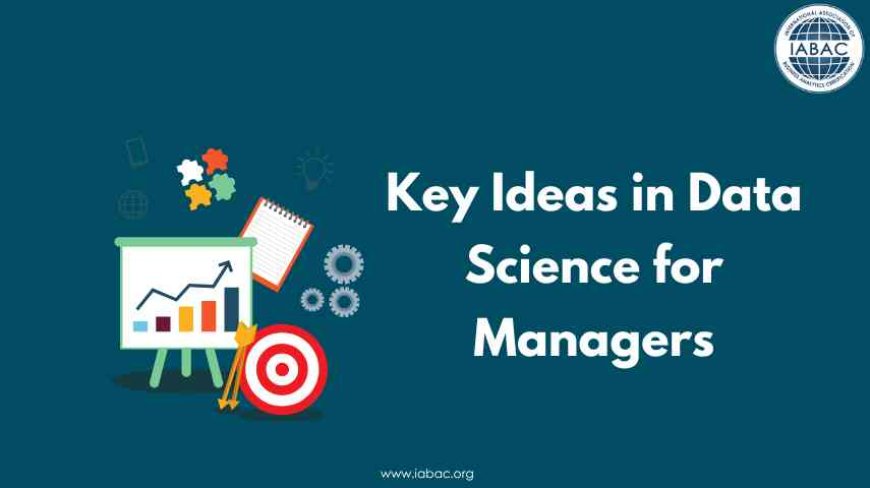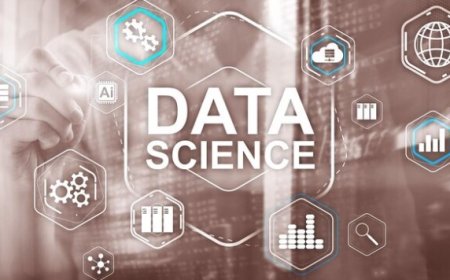Key Ideas in Data Science for Managers
Learn key data science concepts to help managers make better decisions, enhance processes, and lead effective data-driven strategies with ease.

Understanding the basics of data science is crucial for effective management. Whether you’re starting with a Data Science Foundation Certification or moving up to a Data Science Developer Certification, grasping these key concepts is vital.
Businesses are increasingly guided by data, and as Data Science for Managers, being skilled in data science can significantly improve our decision-making and help us lead our teams toward innovative and efficient solutions. By earning credentials like the Data Scientist Certification or Machine Learning Expert Certification, we can use data more effectively to shape our business strategies. In this blog, I'll cover important data science principles tailored for managers and show how applying these ideas can boost performance and help us reach our business goals.
The Growing Role of Data Science in Management
Data science is becoming increasingly important in management. Companies are now using data to make better decisions and improve how they run. This has created a growing need for professionals who can connect data skills with management.
Ways Data Science Is Impacting Management:
- Better Decision-Making:
- Certified Data Scientist - Operations: These experts use data to make operations smoother and more cost-effective.
- Certified Data Scientist - Finance: In finance, they use data to enhance forecasting, manage risks, and improve investment choices.
- Certified Data Scientist - HR: HR teams use data to improve hiring, employee retention, and performance tracking.
- Certified Data Scientist - Marketing: Marketing teams apply data to target audiences better, evaluate campaigns, and boost customer engagement.
- Strategic Planning:
- Data Science Certified Manager: Managers with this certification can incorporate data science into strategic planning, ensuring decisions are based on solid data insights.
- Technical Expertise:
- Certified Data Engineer: Data engineers set up and maintain the systems that store and organize data for analysis.
- Certified MLOps Engineer: MLOps engineers focus on deploying and managing machine learning models, making it easier to integrate these models into business processes.
- Leadership in Data Science:
- Data Science for Managers: This involves teaching managers how to use data science tools and techniques to make smart decisions and lead data-driven projects.
What is Data Science for Managers
Data Science for Managers means learning how to use data science methods to make informed decisions, guide data projects, and help teams use data to reach business goals.
How to Be a Great Data Science Manager:
- Learn Data Science Basics: Understand key concepts, tools, and techniques in data science.
- Encourage a Data-Driven Approach: Promote the use of data in decision-making throughout the organization.
- Promote Teamwork: Help data scientists and other departments work together towards common goals.
- Keep Learning: Stay updated on the latest data science trends and advancements to lead effectively in a fast-changing field.
Challenges in Understanding Data Science for Managers
Grasping Data Science concepts can be challenging for managers. Here are some common hurdles:
- Complex Terms: Data Science for Managers often involves specialized jargon that can be confusing without a technical background.
- Too Much Data: The sheer amount of data and analytical methods can be overwhelming and hard to turn into useful insights.
- Integration Problems: Applying Data Science insights to current business processes often means bridging the gap between technical and managerial viewpoints.
- Keeping Up with Tools: Staying updated with rapidly changing Data Science tools and techniques can be tough.
Managers need to focus on aligning Data Science for Managers with business goals and improving communication with technical teams.
How Can Managers Effectively Grasp the Key Ideas in Data Science?
To effectively understand key ideas in data science, managers can use these practical strategies:
- Start with the Basics: Begin with a basic understanding of data science. Online courses and workshops, such as those tailored for managers, offer a great starting point.
- Work with Data Scientists: Regularly interact with your data science team. Learn about their projects, methods, and the challenges they face. This helps make complex technical terms more relatable.
- Learn Data Visualization: Get comfortable with data visualization tools. Being able to see data in a visual format can make complex ideas easier to understand and use.
- Stay Informed: Data science changes quickly. Keep up with new trends and best practices by reading industry news and online resources.
- Promote Ongoing Learning: Encourage a culture of continuous learning in your team. This not only boosts your own knowledge but also keeps your team sharp and innovative.
Using these approaches, managers can better understand and apply data science concepts effectively within their organizations.
Simplifying Data Science for Strategic Decisions
Data science is becoming essential for making smart business decisions. Managers can use data science to improve decision-making and achieve better results. Here’s a simple guide to understanding how data science can help managers with strategic decisions.
How to Simplify Data Science for Managers
- Learn the Data Science Process:
- Define the Problem: Clearly state the business issue or goal.
- Collect Data: Gather relevant data from different sources.
- Clean Data: Prepare and clean the data to ensure it is accurate.
- Explore Data: Look at the data to find patterns and insights.
- Build Models: Create and test models to predict results or categorize data.
- Deploy Models: Use the model in real-world situations.
- Monitor and Update: Keep track of the model’s performance and make updates as needed.
- Use Data Science for Managers:
- Dashboards: Use visual dashboards to see real-time data and key performance indicators (KPIs).
- Predictive Models: Apply models to forecast trends and make informed decisions.
- Scenario Analysis: Examine different scenarios to understand possible outcomes and risks.
- Work with Data Scientists:
- Set Clear Goals: Clearly explain your business goals and expectations.
- Regular Meetings: Have regular meetings to discuss progress and insights.
- Provide Feedback: Give feedback to improve models and approaches.
- Get Training and Resources:
- Data Science for Managers Courses: Take courses to learn the basics and uses of data science.
- Workshops and Seminars: Attend workshops to stay updated on new trends and technologies.
- Promote a Data-Driven Culture:
- Encourage Data Skills: Help your team develop data skills.
- Make Data Central: Use data as a key part of decision-making.
What Does a Data Science Manager Do
A data science manager’s goal is to oversee the use of data science to solve business problems. This role involves:
- Strategic Oversight: Ensuring data science projects align with business goals.
- Team Leadership: Leading a team of data scientists and analysts.
- Resource Management: Allocating resources to achieve the best project results.
- Communication: Clearly presenting findings and insights to stakeholders.
How to Prepare for a Data Science Manager Role
- Education: Get a solid background in data science, statistics, and business analytics.
- Experience: Gain experience in data science roles and managing projects.
- Leadership Skills: Build skills in leadership and project management to effectively lead a team.
- Continuous Learning: Stay informed about the latest trends and technologies in data science.
For more resources on data science courses and certifications for managers, visit the IABAC website.





























